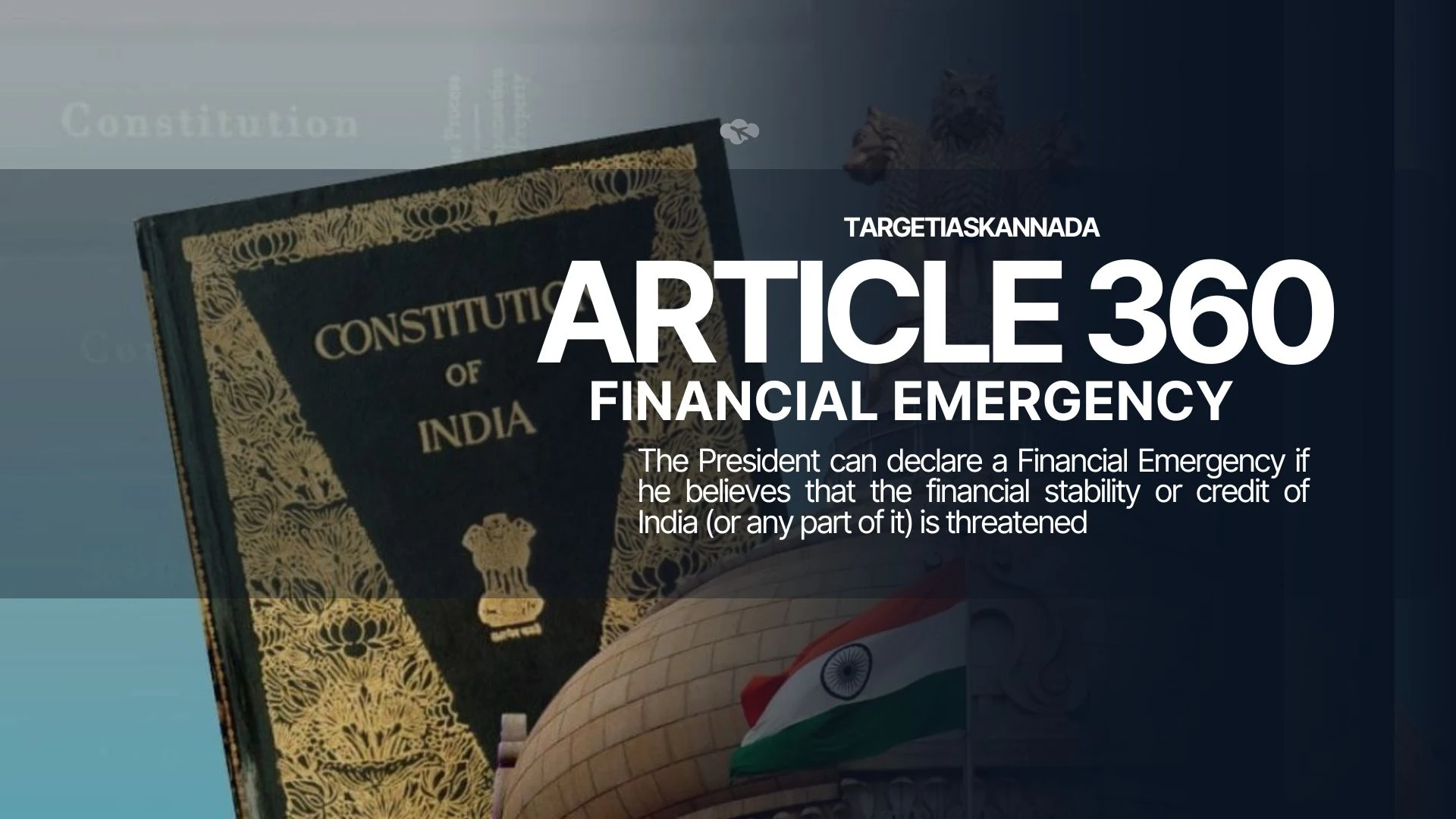Financial Emergency (Article 360)
Grounds for Declaration
- The President can declare a Financial Emergency if he believes that the financial stability or credit of India (or any part of it) is threatened.
- Initially (1975 - 38th Amendment): The President's decision could not be questioned in court.
- Later (1978 - 44th Amendment): This shield was removed, meaning the courts can review the President’s decision if needed.
Parliamentary Approval and Duration
- Step 1: After the President issues the Financial Emergency Proclamation, it must be approved by both Lok Sabha and Rajya Sabha within 2 months.
- What if Lok Sabha is dissolved?
- The Emergency still continues for 30 days from the new Lok Sabha’s first session, but Rajya Sabha must approve it in the meantime.
- No Maximum Time Limit:
- Once approved, the Financial Emergency continues indefinitely until the President revokes it.
- Unlike President’s Rule (Article 356), no repeated parliamentary approval is required.
- Approval Process:
- It only requires a simple majority (more than half of the members present and voting).
- Revocation:
- The President can cancel it anytime by issuing a new proclamation. Parliament’s approval is NOT needed for revocation.
Effects of Financial Emergency
1️⃣ Central Government’s Control Over States
- The Union Government (Centre) can:
- Direct states on how to manage finances properly.
- Issue additional financial rules that states must follow.
2️⃣ Salary Reductions & Budget Control
- The President can:
- Reduce salaries of state government employees.
- Control financial bills by requiring that money bills passed by a state’s legislature must be approved by the President.
3️⃣ Salary Cuts at the National Level
- The President can also:
- Reduce salaries of Central government employees.
- Reduce salaries of Supreme Court & High Court judges.
Implications & Criticism
- Complete financial control shifts to the Centre, making states financially dependent.
- Some argue this threatens state autonomy because:
- The Centre can interfere in a state's financial matters.
- H.N. Kunzru (Constituent Assembly member) warned that this could weaken federalism.
- Dr. B.R. Ambedkar justified its inclusion by citing the 1933 National Recovery Act in the USA, which helped America recover from the Great Depression.
Has India Ever Declared a Financial Emergency?
🚨 No! Although India faced a major economic crisis in 1991, no Financial Emergency was declared. Instead, India adopted economic reforms (liberalization, privatization, globalization - LPG reforms) to fix the crisis.
Criticism of Emergency Provisions (Articles 352, 356, 360)
The emergency provisions in the Indian Constitution have been heavily criticized by several members of the Constituent Assembly due to their potential for misuse. The main concerns were:
1️⃣ Threat to Federalism
- The federal structure (division of powers between Centre and States) gets destroyed during an emergency.
- States lose their autonomy, and the Union Government becomes all-powerful.
2️⃣ Excessive Power in the Hands of the Union Government
- State governments are completely controlled by the Union Executive.
- The Centre can dismiss state governments and take full control (especially under Article 356 - President’s Rule).
3️⃣ Risk of Dictatorship
- The President gets too much power, making him almost a dictator.
- Fundamental rights are suspended, making citizens vulnerable to government excesses.
4️⃣ Loss of Financial Autonomy for States
- During a Financial Emergency (Article 360), the Centre takes full control of state finances.
- State governments cannot freely manage their budget, which weakens their independence.
5️⃣ Fundamental Rights Become Meaningless
- During a National Emergency (Article 352):
- Freedom of speech, expression, and other fundamental rights can be suspended.
- Citizens cannot even challenge the government in court for violating rights.
- This destroys the democratic foundations of the Constitution.
Statements from Constituent Assembly Members
🗣 H.V. Kamath (Strong Opponent)
- Warned that emergency provisions could lead to a totalitarian (authoritarian) state.
- Said it would turn India into a police state where citizens' rights are constantly at risk.
- Feared that India could become a country where "peace" exists only in graves and empty deserts.
🗣 K.T. Shah (Harsh Critic)
- Called emergency provisions “a chapter of reaction and retrogression” (taking India backward).
- Believed they were designed to:
- Give too much power to the Centre over States.
- Give the government excessive control over people’s rights.
- Said that liberty and democracy would exist only in name under such provisions.
🗣 T.T. Krishnamachari
- Feared that the President and Executive would rule as “constitutional dictators”.
🗣 H.N. Kunzru
- Focused on financial emergency provisions, saying they completely destroy the financial independence of states.
Supporters of Emergency Provisions
🗣 Sir Alladi Krishnaswami Ayyar
- Strongly defended emergency provisions, calling them the “life-breath of the Constitution”.
- Believed they were necessary to maintain national unity and security.
🗣 Mahabir Tyagi
- Said emergency provisions act as a "safety valve", ensuring the Constitution remains stable in times of crisis.
🗣 Dr. B.R. Ambedkar (Balanced View)
- Defended emergency provisions but admitted that they could be misused.
- Acknowledged that some leaders might abuse these powers for political gain.
Key Takeaways
✅ Emergency provisions are meant to protect the country during crises but come with risks.
✅ Critics feared they could be used to crush democracy and federalism.
✅ Supporters saw them as necessary safeguards for the Constitution.
✅ Dr. Ambedkar himself admitted the possibility of misuse, making it clear that strong checks and balances are needed.
Final Thought
India has seen misuse of Emergency powers, especially during the 1975-77 Emergency declared by Indira Gandhi. This period justified many of the concerns raised by critics in the Constituent Assembly. However, reforms like the 44th Amendment (1978) added safeguards to prevent future misuse.

